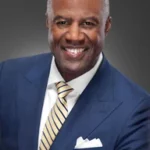
Garry Bridgeman started his career with Merrill Lynch in Jackson, Mississippi, in 1979. He distinguished himself by becoming the state's first African American registered representative employed by a major brokerage firm. "My interest in our industry began as a kid. I would track local companies in our newspaper. Earnings reports were interesting to me. I tried to understand why a penny per share of earnings could have such an impact on a company’s stock movement" That was only the beginning. Garry's interest in the financial services industry was furthered when he attended Indiana University. "I found finance courses interesting, and the entire field of business was intriguing to me. It was at IU that I developed an interest in working with institutions." Garry moved to Mississippi and started working in the industry. Garry had several people he viewed as mentors he respected for their success in business and the contributions they made to the community. In addition, he said, "older successful advisors in my branch office provided invaluable guidance and support. My early branch office and regional managers instilled a sense of belief in what I could accomplish. They provided advice about how to run a successful business. This framework enabled me to become the top producer in that state." He pointed out that there were significant challenges with being an African American financial advisor. "I started my career in 1979 in the state [of Mississippi] that was last in per-capita income in the United States and historically had notable social challenges. My strategy was to aggregate wealth and find people who would be open to working with an African American. I got a lot of attention after I became the top African American financial advisor for Merrill Lynch in the country while being a producer in Mississippi." He subsequently moved to Atlanta and became a producing manager for Merrill Lynch’s Mid-town office. After transitioning to Merrill Lynch’s Private Banking & Investment Group for a number of years, he completed his career with Morgan Stanley as a Graystone Consulting Institutional Consulting Director. Now Garry is a long way from trying to find clients willing to work with him, as a celebrated financial advisor who was three times selected by Barron's magazine as one of the "Top 1000 Advisors" in the country. Recently retired, he continues to use his platform, expertise, and experience to create change within the industry. For the Institute, Garry has been instrumental in the organization's diversity, equity, and inclusion efforts. He currently serves as co-chair of the THRIVE Council of Ambassadors, which advises on the THRIVE Center for Diversity & Inclusion activities. Garry's passion for this issue is palpable. "Creating and maintaining an environment of inclusion is essential. By highlighting the diversity of our membership, we can provide a leadership path for volunteers." While there is still work to be done, he is very optimistic about the direction of the industry when it comes to diversity, inclusion, and equity. "As an industry, we need to do a better job promoting and highlighting the successes of all minorities. White males have long dominated the industry. People want to see others who look like them—who have traveled a similar path— championed. IWI is uniquely positioned to lead change. The organization has long embraced different points of view and recognized the value of diversity. The board and committees have attempted to represent the diversity of our membership." Garry believes that we have come a long way since he first entered the industry, especially when it comes to the dialogue around issues. "People are now speaking a similar language around the subject of diversity. We’re positioned better than what I’ve witnessed during my career to find appropriate solutions. I believe meaningful change is in our future." Adding, "These topics really affect people. With the discussion of diversity, we are really talking about lives, about people, about the hardships that people endure." But Garry is also thinking beyond just the financial services industry adding, "when the talents of all people are being respected and utilized, you will see a better community, a better more prosperous country."
More Details